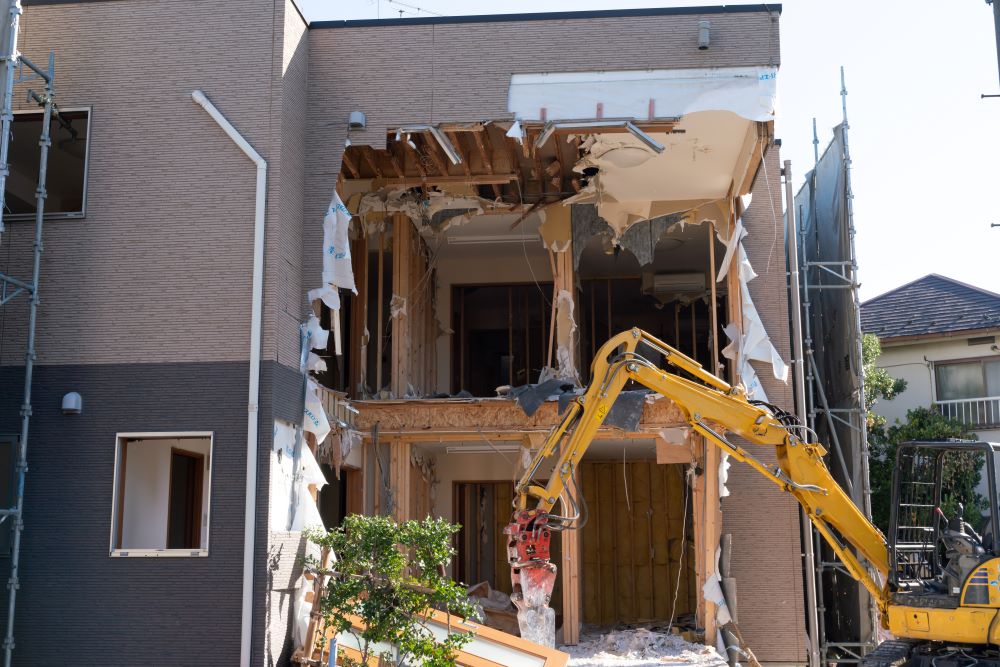
How Industrial Demolition Companies Handle Urgent Situations
Emergencies may strike at any time in the field of industrial demolition, posing problems that require quick thinking and experience. These situations often include buildings collapsing, dangerous substance spills, or the location having to be cleared quickly owing to safety issues. Industrial demolition firms are experienced in dealing with these kinds of situations; they use their specific expertise and experience to quickly analyze the problem and create a thorough plan of action.
Furthermore, in order to develop suitable plans and carry out focused solutions, it is essential to comprehend the particular complexity of urgent industrial demolition circumstances. A comprehensive understanding of the issue is essential for everything from recognizing possible risks to securing the site and carrying out required demolition procedures. Industrial demolition specialists are able to customize their reaction to match the particular needs of each urgent scenario by closely examining its details.
OUR SERVICES
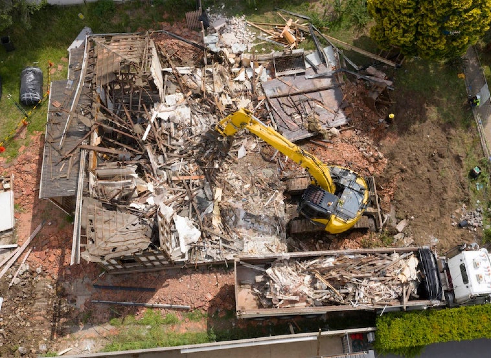
Structure Demolition. Residential, Commercial & Industrial
If your structure poses a health, safety, or environmental risk, demolition can prevent costly citations or fatal accidents. While this may seem daunting, you are just a phone call away from having your residential demolition done professionally, responsibly, and at a great price.
Talk to a Demolition Specialist Now! 916.249.5001
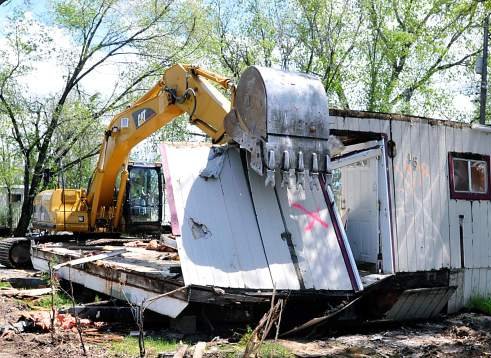
Mobile Home Demolition
We demolish and haul away mobile homes. Any size, anywhere, anyhow. We are fast, clean and competitive. We serve most of Northern California. There are many factors to consider when removing or demolishing your old trailer, mobile home, or manufactured home like: the processes involved, costs, time, contractors, debris, and permits.
Talk to a Demolition Specialist Now! 916.249.5001
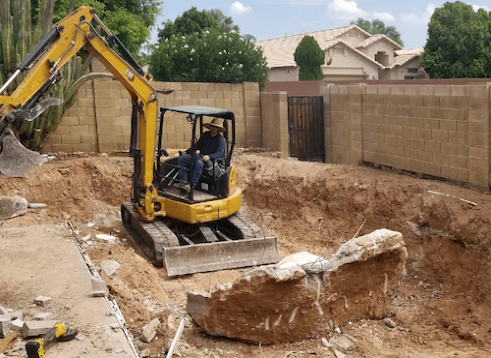
Pool Demolition
When removing a pool in Sacramento, California with the professional demolition team of Maxton Demo, you’re guaranteed peace of mind from beginning to end. From your initial request for an estimate to clean-up, you can expect our pool demolition process that’s completely professional and safe.
Talk to a Demolition Specialist Now! 916.249.5001
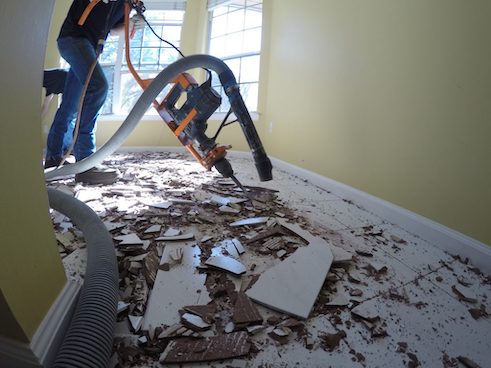
Floor Demolition
Flooring demolition, like any other major home renovation work, requires a specific set of skills and tools to be performed properly. You need experts in flooring demolition to get you the best floors possible. Contact us to find out more about how we can help you today.
Talk to a Demolition Specialist Now! 916.249.5001
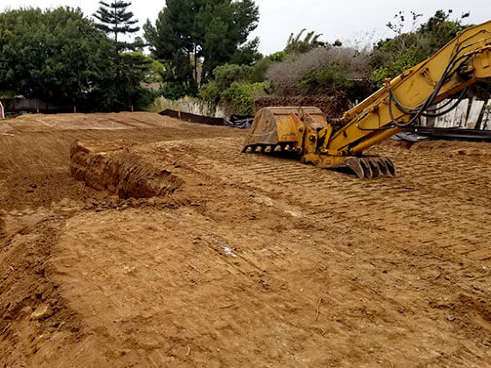
Grading & Excavating
If you need an experienced excavator and grader in Sacramento, call us today. One of the many reasons that residential, commercial, and industrial customers choose to work with us is because we’re able to provide a broad range of services to help construction-related projects get done in less time and at a reduced cost.
Talk to a Demolition Specialist Now! 916.249.5001

Roof Snow Removal
Heavy snow & ice dams can cause significant roof and home damage. Roof Snow removal is our specialty during the winter months. Serving the Sacramento, California area for 10 years, we can get your roof snow removed and promise a quick response and reasonable rates.
Talk to a Demolition Specialist Now! 916.249.5001
The Value of Managing Emergencies Effectively
It is impossible to exaggerate the importance of effectively handling emergency circumstances in the industrial demolition industry. In addition to guaranteeing the safety of the surrounding surroundings and people, prompt and efficient management of crises is crucial for reducing the impact on project budgets and schedules. In this sense, industrial demolition firms are essential because they use their knowledge and resources to maneuver through difficult situations with accuracy and resiliency.
Industrial demolition companies show their dedication to safety regulations and operational performance by emphasizing rapid execution and proactive planning. The company’s expertise and commitment to project success and customer happiness are shown by its ability to act quickly in emergency circumstances. Industry professionals in industrial demolition maintain the integrity of their work even in the face of unanticipated situations by means of rigorous coordination and adherence to best procedures.
Time is of the essence when dealing with emergency circumstances, and being able to respond quickly may significantly reduce risks and minimize interruptions. Experts in industrial demolition are aware of how urgent these situations are and have the tools necessary to effectively deploy resources to meet the problems at hand. These firms make sure that emergency situations are handled well, protecting people and property by putting safety and accuracy first.
Moreover, the standing and legitimacy of industrial demolition firms depend on their ability to effectively manage emergency scenarios. These companies are trusted by their clients with important projects that call for a high degree of skill and dependability, particularly in the face of unforeseen difficulties. Industrial demolition businesses position themselves as reliable partners with the ability to perform well under duress by showcasing a history of handling critical situations effectively.
Safety Protocols for Fast Industrial Demolition Situations
At the core of efficient emergency response procedures is ensuring the safety of all people participating in urgent industrial demolition situations. To reduce hazards and avoid accidents in high-pressure circumstances, industrial demolition firms follow strict safety regulations. The safety of its employees and the environment are given first priority by these companies, which demonstrate this by carrying out extensive risk assessments and putting strong safety protocols in place.
Because there is greater danger and uncertainty in emergency circumstances, it is much more important to employ safety precautions. Before beginning any demolition operations, industrial demolition specialists are trained to quickly identify possible dangers and take proactive measures to resolve them. These specialists provide a safe working environment that supports effective and risk-free operations by placing a strong emphasis on safety awareness and adherence to industry laws.
Furthermore, in situations involving urgent industrial demolition, safety precautions go beyond simple physical defenses and include emergency planning and response techniques. To provide their staff with the abilities and information required to handle emergency circumstances, industrial demolition firms engage in thorough training programs and safety certifications. These companies maintain the highest standards of occupational health and safety in the sector by promoting a culture of safety awareness and continual development.
Procedures for Industrial Demolition Companies’ Emergency Response
Industrial demolition businesses depend on well-established emergency response procedures to direct their activities and decision-making processes in the case of severe circumstances demanding quick intervention. These procedures are intended to simplify communication, enable quick resource mobilization, and guarantee a coordinated strategy for successfully handling crises. Industrial demolition companies are able to react quickly and effectively to emergency circumstances by clearly defining roles and authority.
The creation of command structures that specify the responsibilities of important individuals and provide channels of communication for the exchange of information in real time is essential to emergency response procedures. Time-sensitive judgments need to be taken quickly in emergency situations, which calls for a hierarchical architecture that facilitates prompt and efficient decision-making.
Utilizing their operational know-how and organizational structure, industrial demolition firms plan a coordinated emergency response that minimizes confusion and maximizes efficiency.
In addition, emergency response methods include risk mitigation techniques and contingency planning to foresee future issues and take proactive measures to resolve them. Industrial demolition businesses prepare their teams for a variety of critical scenarios by performing scenario-based training exercises and simulations. This helps the teams react confidently and competently in real-life crises.
These companies maintain a culture of readiness and resilience that makes them stand out in the sector by regularly improving and assessing their emergency response procedures.
Tools and Equipment for Rapid Industrial Demolition
The capacity to handle emergency circumstances in industrial demolition effectively depends on the availability and use of specialized tools and equipment that support safe and effective demolition operations. Heavy-duty demolition equipment and sophisticated cutting and dismantling tools are just a few of the many tools and equipment that industrial demolition firms invest in, all of which are suited to the particular needs of emergency situations. These companies may efficiently limit disturbances and accelerate the demolition process by using cutting-edge technology and equipment.
Excavators, bulldozers, cranes, and hydraulic breakers are some of the essential pieces of machinery often utilized in urgent industrial demolition. These tools allow for the exact and controlled destruction of buildings in dangerous or tight locations.
Furthermore, precise and quick demolition of steel and reinforced concrete buildings is accomplished with the use of specialist cutting instruments like concrete crushers and diamond wire saws. Optimizing results and improving operational efficiency are ensured by the strategic deployment of equipment according to the unique requirements of the emergency scenario.
Furthermore, in order to maintain operational dependability and safety requirements in emergency situations, industrial demolition firms give top priority to equipment maintenance and inspection. In order to avoid malfunctions and guarantee optimal performance during emergency situations, it is essential that equipment undergo routine repair and calibration.
Through rigorous adherence to maintenance schedules and quality assurance processes, these companies ensure that their equipment is operationally ready, enabling them to accurately and efficiently carry out essential demolition jobs.
Qualifications and Training for Managing Critical Events in Industrial Demolition
Personnel working for demolition businesses must possess the necessary training and qualifications in order to react to emergency circumstances in industrial demolition. Thorough training programs and industry certifications are essential for providing workers with the skills and information needed to handle emergency situations with competence and confidence.
Industrial demolition companies make sure that their staff is equipped with the knowledge and skills necessary to manage emergency circumstances with accuracy and skill by investing in ongoing training and professional development.
A broad variety of subjects are covered in industrial demolition emergency response training, such as danger identification, equipment operation, safety measures, and emergency response protocols. In order to improve their ability to make decisions under duress and to replicate real-life situations, employees go through intensive training exercises and simulations.
Furthermore, credentials like OSHA (Occupational Safety and Health Administration) training and demolition-specific credentials verify the ability of staff members to carry out urgent demolition jobs effectively and safely.
Furthermore, maintaining a high degree of expertise in handling emergency circumstances requires constant professional growth and skill improvement. In order to keep up to date with developing technology and industry best practices, industrial demolition businesses place a high priority on information exchange and continual learning within their staff.
These companies position themselves as leaders in the industrial demolition industry by developing a workforce that is flexible and resilient in the face of unanticipated obstacles through the promotion of excellence and innovation.
Using an Industrial Demolition Firm in an Emergency
Hiring an industrial demolition firm with a good reputation is essential to providing a prompt and efficient response in cases of emergencies requiring demolition and site clearing.
Due to their extensive training, experience, and resource base, industrial demolition companies are able to handle emergency situations with skill and professionalism. Clients may feel secure knowing that their emergency requirements will be handled with the utmost skill and speed by working with a reputable demolition business.
Hiring an industrial demolition firm for an emergency usually starts with a detailed evaluation of the needs of the customer and the specifics of the emergency. Through site assessment and risk analysis, the demolition business may create a customized action plan that complies with the goals of the customer and takes safety into account.
A smooth and effective execution of an execution of an emergency response plan depends on the customer and the demolition crew working together and communicating clearly.
Furthermore, before hiring an industrial demolition business for an emergency, it is important to thoroughly consider their reputation and past performance. References from satisfied customers, a project portfolio, and industry certifications are used to evaluate a company’s dependability and emergency response capabilities.
Choosing a demolition company that is trustworthy, certified, and has a track record of successfully completing projects will give customers peace of mind that the business can perform well under duress and maintain the highest levels of professionalism and safety.
Important lessons learned
Industrial demolition firms’ proficiency and commitment to safety are shown by their ability to manage emergency circumstances with accuracy and speed. These businesses show their dedication to operational excellence and customer happiness by comprehending the special difficulties presented by emergency situations and putting strong emergency response policies in place.
For urgent industrial demolition situations to be managed successfully, it is essential to use specialized equipment, provide ongoing training, and follow safety protocols.
Important lessons to be learned from this conversation include the need for prompt involvement, proactive preparation, and clear communication when handling emergency circumstances involving industrial demolition. Industrial demolition firms can handle situations with resiliency and expertise, protecting people and property, by putting safety, professionalism, and readiness first.
In an emergency, hiring a trustworthy industrial demolition business may improve project results, reduce risks, and guarantee a prompt and dependable reaction to unanticipated obstacles in the industrial demolition industry.
Reacting to Structural Failures and Natural Disasters
Following institutional breakdowns and natural catastrophes, communities are often forced to deal with the fallout from these tragic occurrences. It is essential to comprehend the characteristics of natural disasters, including hurricanes, earthquakes, floods, and tsunamis, in order to create efficient reaction plans.
These calamities may occur suddenly, resulting in considerable damage and fatalities. Similar to this, structural failures in bridges, buildings, and other infrastructure present serious threats to public safety and call for quick action to stop more damage.
The key to lessening the effects of structural breakdowns and natural catastrophes is effective reaction and preparation. For emergency response teams to be prepared to manage emergencies when they arise, proactive planning, risk assessment, and training exercises are essential.
Through vulnerability identification, protocol development, and routine exercises, communities may become better prepared for unexpected occurrences and react to disasters more quickly.
Local, state, and federal government organizations are essential to the response and reconstruction of disasters. These organizations are in charge of organizing emergency responses, assigning funds, and helping impacted communities.
Government agencies strive to minimize disruptions and expedite the response process after catastrophes by collaborating with diverse stakeholders and implementing emergency management frameworks.
Important Things to Keep in Mind When Handling Natural Disasters and Structural Failures
Creating an emergency response plan is crucial to guaranteeing a well-coordinated and efficient reaction to structural breakdowns and natural catastrophes. Roles and duties, communication guidelines, evacuation plans, and resource allocation tactics should all be included in this strategy.
Communities may improve overall response capabilities and promote cooperation by including important stakeholders in the planning process, such as emergency services, local authorities, and community groups.
Emergency response activities need effective resource mobilization and coordination. In order to meet urgent needs and stabilize damaged communities, resources must be mobilized quickly, from sending out search and rescue teams to providing medical care and shelter.
Response teams may become more effective in their attempts to provide relief by creating clear lines of command and using technology to monitor people and supplies.
During a crisis, efficient communication tactics are essential for making sure that stakeholders and the general public are informed accurately and promptly. By using many communication channels, including social media, emergency alerts, and conventional media sources, emergency responders may effectively reach a broad audience and provide crucial information and guidelines. Communication initiatives may promote trust and collaboration in the community by upholding openness, correcting rumors, and asking for input.
Working together with stakeholders and local communities is essential to creating resilience and a feeling of solidarity in the face of calamity. Social cohesiveness may be reinforced and response capacities improved by integrating community members in decision-making processes, including them in preparation programs, and forming relationships with local groups.
Communities may better handle the particular problems faced by natural catastrophes and structural breakdowns by combining local knowledge, resources, and experience into response operations.
To improve catastrophe planning and response in the future, it is important to assess and learn from previous reactions. Through post-event studies, stakeholder input, and improvement identification, communities may improve their response capabilities and adapt to changing threats.
Communities are able to strengthen their resilience and enhance their ability to withstand future catastrophes via the application of lessons learned, the updating of emergency plans, and investments in technology and training.
Developing future resilience
Natural catastrophes and structural breakdowns need a comprehensive and cooperative response that includes communication, coordination, preparation, and community involvement. Communities may lessen the effects of catastrophes and expedite recovery efforts by recognizing the difficulties presented by these occurrences, creating efficient response plans, and using resources and technology.
By implementing preemptive planning, ongoing enhancement, and a collective dedication to fostering resilience, we may equip ourselves with the necessary tools to react efficiently and bounce back stronger when faced with hardship. Together, let’s build a more secure and resilient future for all.
Do you have a Question?
Talk to a Demolition Specialist Now! 916.249.5001
Request Formal Quote